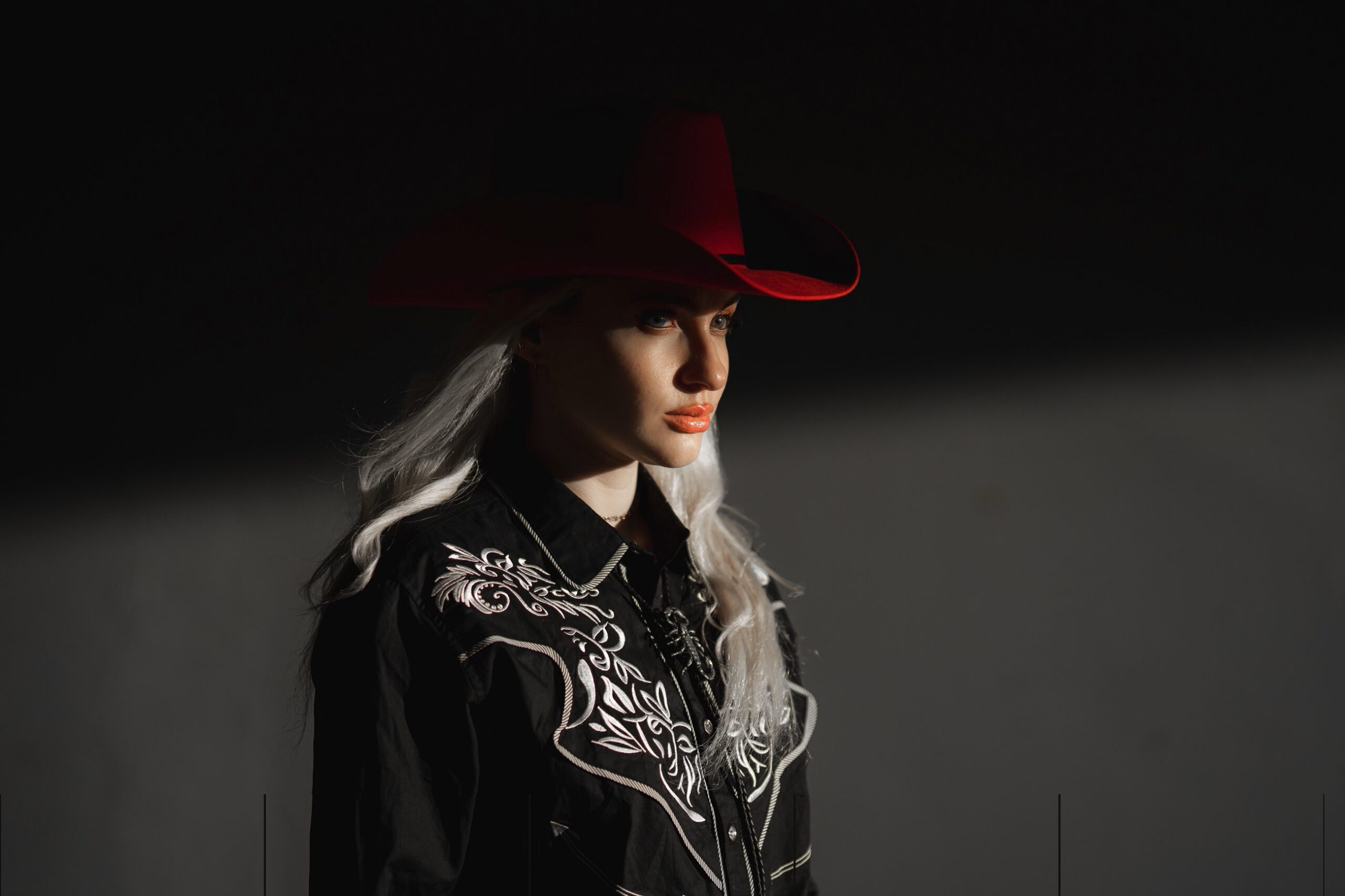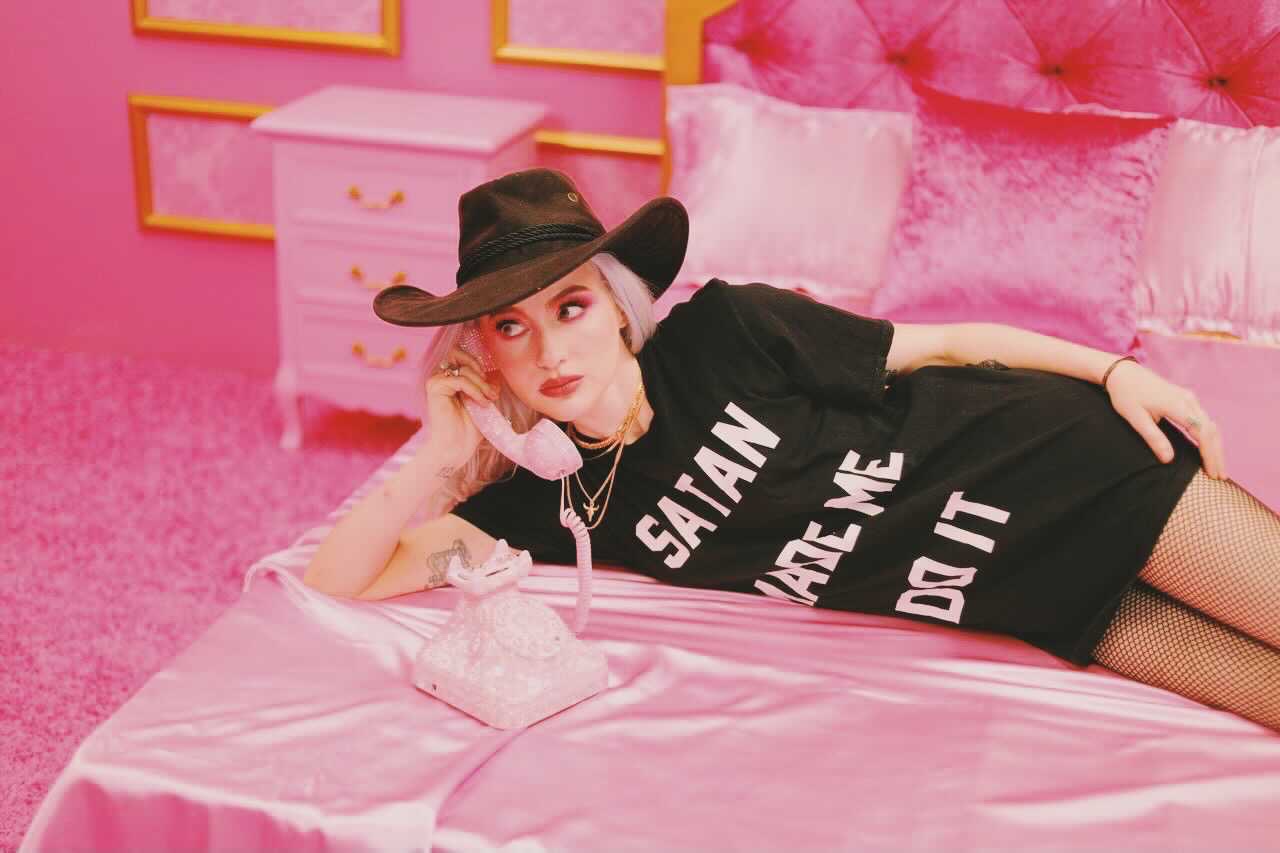
Straight out of the old west but make it goth, DEVORA grew up an outcast and made herself an outlaw. What once served as an outlet is now a career that is just getting started. DEVORA grew up in Arizona, taking in the small desert town life and all the experiences it had to offer. Now she paints that picture for her listeners through her music.
A cat person over a dog person, sweet over salty, and the beach over the mountains. DEVORA is a whiskey girl who prefers to stay in—and if she had to binge anything, it would be reading. Her death row meal of choice? Mac and cheese. And if anyone needed to be her partner in crime, it would be her sister. She loves to travel and when given the chance to switch places with anyone for 24 hours, it has to be Johnny Cash. However, that is just scratching the surface of an artist who is here to change the way you see both country and goth music.
“I think the American Dream is taking care of yourself and staying healthy. I think it’s making sure your oxygen mask is on first, so you can help others.”
When absorbing this fusion of country music and goth, you wonder where it came from and what inspired it. DEVORA took us down memory lane, “Since I was a toddler, I had this obsession with the wild west. As I got older, like middle school / high school, that was when the goth came in. I started listening to all of the emo-goth music. That’s when I was like, ” I want to fuse these together.” She went on to explain when music came into play and how this all truly began, “I’ve been singing and writing my whole life. Especially in [school], I didn’t fit in. So that was my outlet. I would come home and instead of doing homework, I would just write. Always writing songs, poetry, short stories, that sort of thing.”
2020 changed us all. Whether for better or worse, the entire world came out different. For DEVORA, it sparked something in her and we’re witnessing the result now. Going back and reflecting on what truly sent her down this path she said, “When I moved to LA I kinda had this clear vision. But it wasn’t until the pandemic that I was sorta actively turning out this material.”
Previously, DEVORA talked about the inspiration for her EP saying, “When I first moved to LA I used to drive back and forth daily from studios in the valley to where I lived in Hollywood. I remember every time I’d come down the 101 through the hills onto the other side of Hollywood, I’d always see this seemingly random gleaming crucifix perched way up on the hill. I’d ask myself: ‘How can something like this overlook such a godless city?’ It just never really made sense to me. I had to process it in my own way, so naturally I wrote about it. The result was a strikingly relevant and culturally poignant body of art.” If you’re wondering where she’s at now that time has passed and she let the experience create that art, she says, “It’s less of what it was. Before it was reveling over the darkness of the city. It’s a little more cathartic now. I think about this EP (God Is Dead) that’s out and what that looks like. It has changed. It’s lightened.”

Sometimes when you’re trying something new, it can feel a bit too vulnerable. That vulnerability, especially when it requires you to expose parts of your own soul, can make anyone turn around and not want to try. Not DEVORA. She went out there and took the risk. When discussing risk-taking she says, “Country music is different from pop or rock. It feels like there’s boundaries and people don’t want to go outside of that and it caters to a certain type of people. It’s like religion, the homeland, beer, and it has a set kind of pallet of things they use. So when I started going to Nashville last year I was worried I wasn’t going to be accepted. Especially with darker songs. Going in with a song called “God is Dead” I was like: ‘God how is [this] going to work’ but surprisingly, I think it’s a testament to how things are going. Especially in Nashville, people are open-minded. It’s opened the door for artists to explore sort of non-traditional themes. Hopefully, in the next couple of years, it goes a little further and pushes the boundaries even more.”
Now that the risk has been taken and a different kind of music is evolving, one called “Outlaw Pop,” we wondered if there was anyone DEVORA would like to recruit to take this on with. She said, “There’s an artist out of Nashville called Jelly Roll, and then there are two guys I’m obsessed with called Cowetzel, and another one who goes by Hardy. Tyle Childers. There’s a few that are doing an edgier side of country.”
Looking ahead, DEVORA is ready for more growth. Of course, we had to talk about 2023 goals and she said, “I can’t wait to tour again. I’m excited to get back out there. I feel like every time I tour I make more and more people part of this burgeoning community. I’m excited to build that community. I’m excited for what’s next. I feel like, with this genre, I’ve just scratched the surface.”


Photo Credit: Jim Louvau
While listening to God is Dead there is an important theme to keep in mind and that is, “taking the American Dream as it was and flipping it on its head. Stepping back and looking back on it and looking at it from the perspective of my generation.”
So what is the American Dream now? What was once a white picket fence, a couple of kids, and a solid 9–5 has died. DEVORA let us in on what she thinks, “I’m a huge advocate for mental health stuff. So I think what the American Dream is now is so vast from what it was. I think it’s amidst all this chaos staying centered, staying whole. I think our values have shifted. The importance of family and loved ones, especially in the last few years, has heightened. I think the American Dream is taking care of yourself and staying healthy. I think it’s making sure your oxygen mask is on first, so you can help others.”
“It’s like religion, the homeland, beer, and it has a set kind of pallet of things they use. So when I started going to Nashville last year I was worried I wasn’t going to be accepted.”
She has spoken about the darker times of the pandemic and how we all had those moments of hopelessness. She talks a bit about her personal experience, “I think there were so many chapters of those two and a half years. I think looking back it was one big fog, soup, you know? It was 2019 and now it’s 2023. So I think in stages… everyone handled it differently. It’s like stages of grief.”
However, she made it to the other side. If she could tell herself, or anyone else who is still in that headspace anything it would be that, “Things are the way they are today but it doesn’t mean they’ll be like that tomorrow. Tomorrow everything could change. With the pandemic, it’s like ‘yes today we’re in this dire situation but if you string a bunch of tomorrows together, you’ll be in a completely different place.’”
What is most unique about DEVORA is she is creating a genre all her own. She is laying out the foundation for “Outlaw Pop” and making a space for people just like her. She pushes boundaries in a way that encourages people around her to do the same. She is out there breathing new life into the American Dream by telling stories and painting pictures for our generation. It’s okay that it’s all changed. Let’s be like DEVORA and embrace it to make it our own.


